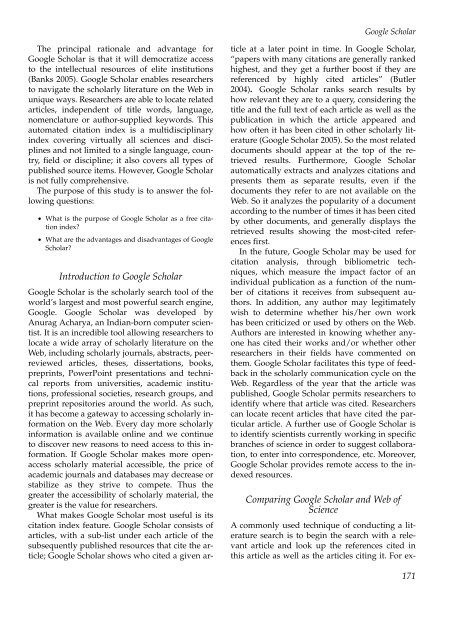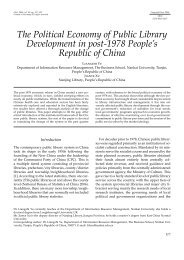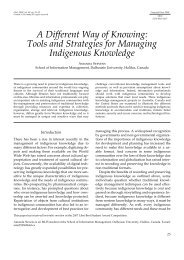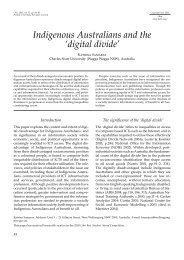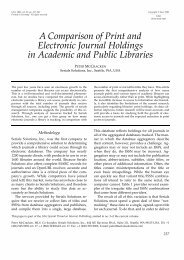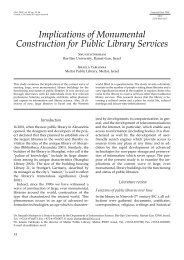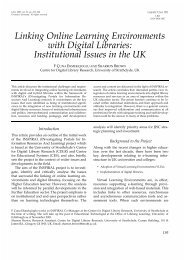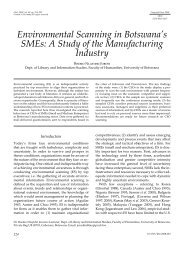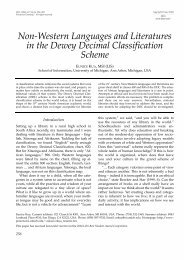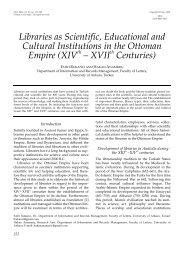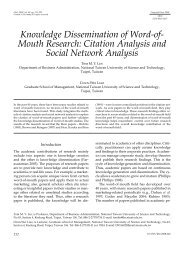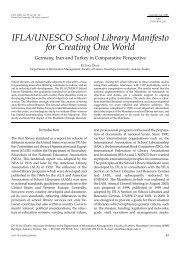Google Scholar: The New Generation of Citation Indexes - Libri
Google Scholar: The New Generation of Citation Indexes - Libri
Google Scholar: The New Generation of Citation Indexes - Libri
You also want an ePaper? Increase the reach of your titles
YUMPU automatically turns print PDFs into web optimized ePapers that Google loves.
<strong>Google</strong> <strong>Scholar</strong><strong>The</strong> principal rationale and advantage for<strong>Google</strong> <strong>Scholar</strong> is that it will democratize accessto the intellectual resources <strong>of</strong> elite institutions(Banks 2005). <strong>Google</strong> <strong>Scholar</strong> enables researchersto navigate the scholarly literature on the Web inunique ways. Researchers are able to locate relatedarticles, independent <strong>of</strong> title words, language,nomenclature or author-supplied keywords. Thisautomated citation index is a multidisciplinaryindex covering virtually all sciences and disciplinesand not limited to a single language, country,field or discipline; it also covers all types <strong>of</strong>published source items. However, <strong>Google</strong> <strong>Scholar</strong>is not fully comprehensive.<strong>The</strong> purpose <strong>of</strong> this study is to answer the followingquestions:• What is the purpose <strong>of</strong> <strong>Google</strong> <strong>Scholar</strong> as a free citationindex?• What are the advantages and disadvantages <strong>of</strong> <strong>Google</strong><strong>Scholar</strong>?Introduction to <strong>Google</strong> <strong>Scholar</strong><strong>Google</strong> <strong>Scholar</strong> is the scholarly search tool <strong>of</strong> theworld’s largest and most powerful search engine,<strong>Google</strong>. <strong>Google</strong> <strong>Scholar</strong> was developed byAnurag Acharya, an Indian-born computer scientist.It is an incredible tool allowing researchers tolocate a wide array <strong>of</strong> scholarly literature on theWeb, including scholarly journals, abstracts, peerreviewedarticles, theses, dissertations, books,preprints, PowerPoint presentations and technicalreports from universities, academic institutions,pr<strong>of</strong>essional societies, research groups, andpreprint repositories around the world. As such,it has become a gateway to accessing scholarly informationon the Web. Every day more scholarlyinformation is available online and we continueto discover new reasons to need access to this information.If <strong>Google</strong> <strong>Scholar</strong> makes more openaccessscholarly material accessible, the price <strong>of</strong>academic journals and databases may decrease orstabilize as they strive to compete. Thus thegreater the accessibility <strong>of</strong> scholarly material, thegreater is the value for researchers.What makes <strong>Google</strong> <strong>Scholar</strong> most useful is itscitation index feature. <strong>Google</strong> <strong>Scholar</strong> consists <strong>of</strong>articles, with a sub-list under each article <strong>of</strong> thesubsequently published resources that cite the article;<strong>Google</strong> <strong>Scholar</strong> shows who cited a given articleat a later point in time. In <strong>Google</strong> <strong>Scholar</strong>,“papers with many citations are generally rankedhighest, and they get a further boost if they arereferenced by highly cited articles” (Butler2004). <strong>Google</strong> <strong>Scholar</strong> ranks search results byhow relevant they are to a query, considering thetitle and the full text <strong>of</strong> each article as well as thepublication in which the article appeared andhow <strong>of</strong>ten it has been cited in other scholarly literature(<strong>Google</strong> <strong>Scholar</strong> 2005). So the most relateddocuments should appear at the top <strong>of</strong> the retrievedresults. Furthermore, <strong>Google</strong> <strong>Scholar</strong>automatically extracts and analyzes citations andpresents them as separate results, even if thedocuments they refer to are not available on theWeb. So it analyzes the popularity <strong>of</strong> a documentaccording to the number <strong>of</strong> times it has been citedby other documents, and generally displays theretrieved results showing the most-cited referencesfirst.In the future, <strong>Google</strong> <strong>Scholar</strong> may be used forcitation analysis, through bibliometric techniques,which measure the impact factor <strong>of</strong> anindividual publication as a function <strong>of</strong> the number<strong>of</strong> citations it receives from subsequent authors.In addition, any author may legitimatelywish to determine whether his/her own workhas been criticized or used by others on the Web.Authors are interested in knowing whether anyonehas cited their works and/or whether otherresearchers in their fields have commented onthem. <strong>Google</strong> <strong>Scholar</strong> facilitates this type <strong>of</strong> feedbackin the scholarly communication cycle on theWeb. Regardless <strong>of</strong> the year that the article waspublished, <strong>Google</strong> <strong>Scholar</strong> permits researchers toidentify where that article was cited. Researcherscan locate recent articles that have cited the particulararticle. A further use <strong>of</strong> <strong>Google</strong> <strong>Scholar</strong> isto identify scientists currently working in specificbranches <strong>of</strong> science in order to suggest collaboration,to enter into correspondence, etc. Moreover,<strong>Google</strong> <strong>Scholar</strong> provides remote access to the indexedresources.Comparing <strong>Google</strong> <strong>Scholar</strong> and Web <strong>of</strong>ScienceA commonly used technique <strong>of</strong> conducting a literaturesearch is to begin the search with a relevantarticle and look up the references cited inthis article as well as the articles citing it. For ex-171


